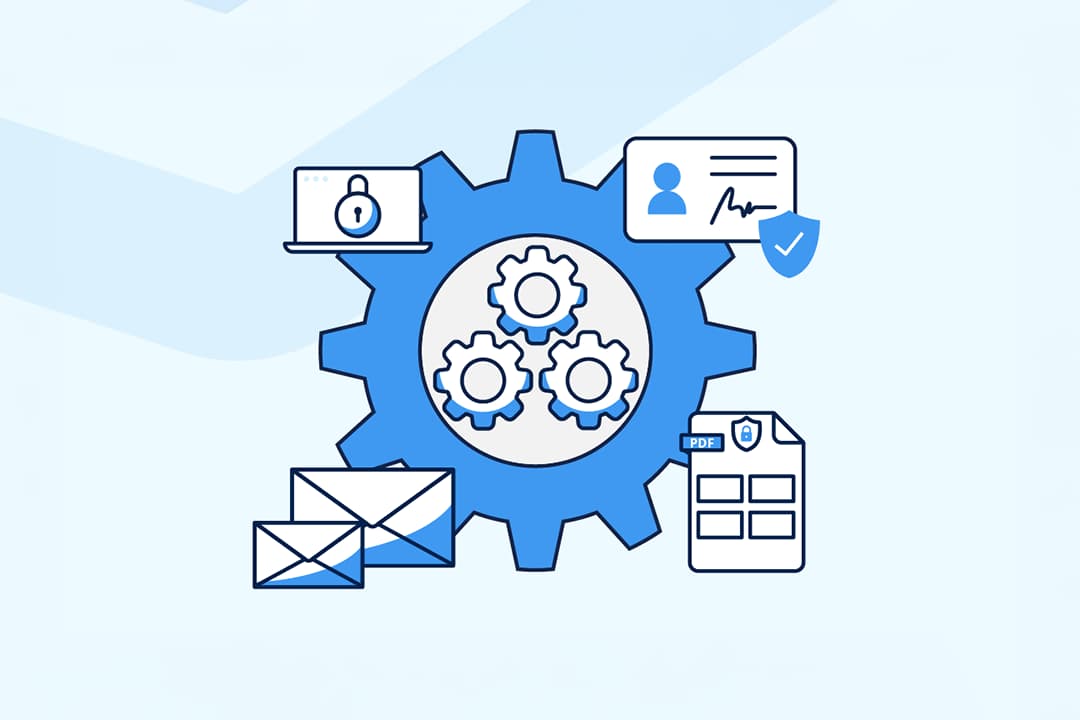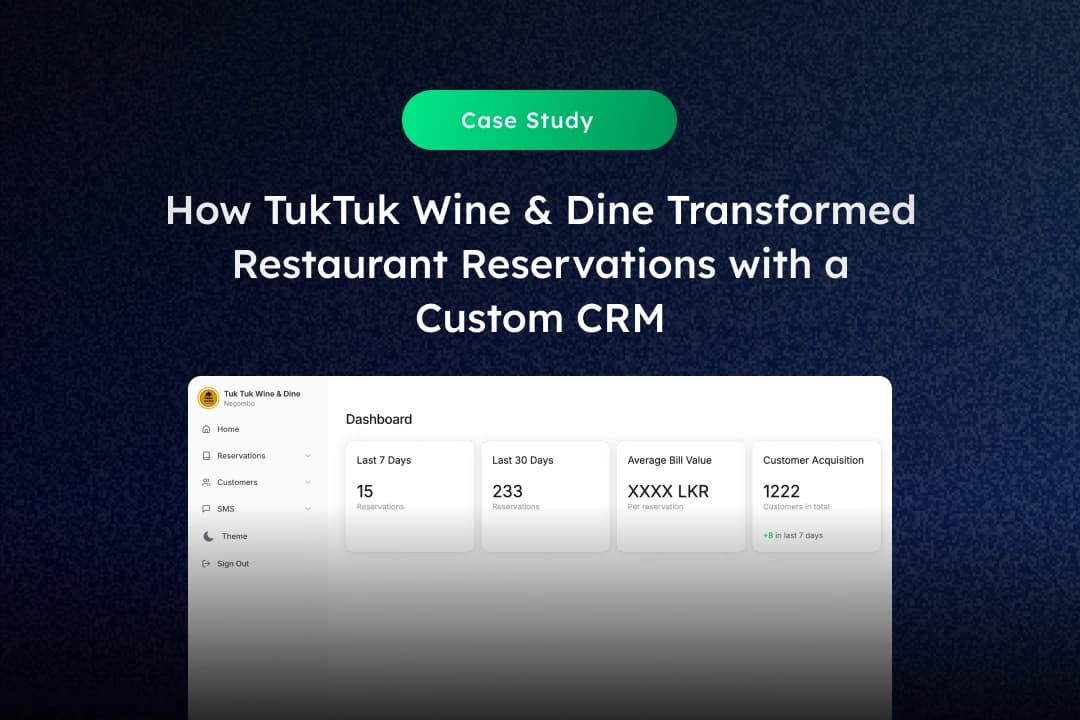
Introduction
In today's competitive business environment, efficiency is not just an advantage—it's a necessity. Business Process Automation (BPA) has emerged as a game-changer for companies looking to reduce costs, eliminate errors, and scale operations effectively. For Sri Lankan businesses, automation presents unique opportunities to overcome operational challenges while maintaining quality and customer satisfaction. This comprehensive guide explores how automation can transform your business operations and drive sustainable growth.
What is Business Process Automation?
Business Process Automation refers to the use of technology to execute recurring tasks or processes in a business where manual effort can be replaced. It involves using software applications to perform routine business processes automatically, reducing the need for human intervention while improving accuracy and speed.
Key Components of BPA:
- Workflow Management: Automated routing of tasks and approvals
- Data Integration: Seamless connection between different systems
- Rule-Based Logic: Automated decision-making based on predefined criteria
- Monitoring and Reporting: Real-time visibility into process performance
- Exception Handling: Automated responses to errors or unusual situations
Why Automation Matters for Sri Lankan Businesses
Current Business Challenges in Sri Lanka
- Labor Costs: Rising operational expenses affecting profitability
- Skill Shortages: Difficulty finding qualified personnel for specialized tasks
- Manual Errors: Human mistakes leading to customer dissatisfaction and financial losses
- Scalability Issues: Difficulty expanding operations without proportional cost increases
- Competition: Need to compete with regional and international businesses
Benefits of Automation
- Cost Reduction: Up to 60% reduction in operational costs for routine tasks
- Improved Accuracy: 99.9% accuracy in automated processes vs. 95% in manual processes
- Faster Processing: 10x faster completion of routine tasks
- 24/7 Operations: Continuous processing without human intervention
- Better Compliance: Automated adherence to regulations and standards
Types of Business Processes Suitable for Automation
1. Customer Service Automation
Processes to Automate:
- Customer inquiry routing
- FAQ responses
- Order status updates
- Appointment scheduling
- Complaint tracking
Tools and Technologies:
- Chatbots and virtual assistants
- Email automation systems
- CRM integration
- Knowledge base systems
- Multi-channel communication platforms
Sri Lankan Implementation:
- Support for Sinhala and Tamil languages
- Integration with local communication channels (WhatsApp, Viber)
- Cultural adaptation for customer interactions
2. Financial Process Automation
Processes to Automate:
- Invoice generation and processing
- Payment reminders and collections
- Expense management
- Financial reporting
- Tax calculation and filing
Benefits for Sri Lankan Businesses:
- Compliance with local tax regulations
- Integration with Sri Lankan banking systems
- Automated GST calculations
- Real-time financial monitoring
3. Human Resources Automation
Processes to Automate:
- Employee onboarding
- Leave management
- Performance tracking
- Payroll processing
- Training and development tracking
Local Considerations:
- Compliance with Sri Lankan labor laws
- Integration with EPF and ETF systems
- Support for local holidays and working patterns
4. Inventory and Supply Chain Management
Processes to Automate:
- Stock level monitoring
- Purchase order generation
- Supplier communication
- Delivery tracking
- Quality control processes
Sri Lankan Context:
- Integration with local suppliers and logistics providers
- Support for import/export documentation
- Currency and exchange rate automation
5. Marketing and Sales Automation
Processes to Automate:
- Lead generation and qualification
- Email marketing campaigns
- Social media posting
- Customer segmentation
- Sales pipeline management
Local Market Adaptation:
- Cultural calendar integration (festivals, holidays)
- Local language content generation
- Regional market analysis
Popular Automation Tools and Platforms
1. Workflow Automation Platforms
Zapier
- Connects over 3,000 apps
- No-code automation
- Ideal for small to medium businesses
- Cost-effective solution
Microsoft Power Automate
- Part of Microsoft 365 ecosystem
- Strong integration capabilities
- Enterprise-grade security
- Good for existing Microsoft users
UiPath
- Robotic Process Automation (RPA)
- Handles complex, repetitive tasks
- Visual process designer
- Strong for legacy system integration
2. Industry-Specific Solutions
For Retail:
- Shopify automation tools
- Inventory management systems
- Customer service platforms
For Manufacturing:
- ERP systems (SAP, Oracle)
- Production planning tools
- Quality management systems
For Services:
- CRM platforms (Salesforce, HubSpot)
- Project management tools
- Client communication systems
3. Custom Development Solutions
When to Consider Custom Solutions:
- Unique business processes
- Complex integration requirements
- Specific compliance needs
- Competitive advantage through automation
Implementation Strategy for Sri Lankan Businesses
Phase 1: Assessment and Planning (Weeks 1-4)
Process Audit:
- Identify repetitive, time-consuming tasks
- Map current workflows and pain points
- Calculate time and cost savings potential
- Prioritize processes for automation
Technology Assessment:
- Evaluate current systems and infrastructure
- Identify integration requirements
- Assess technical capabilities
- Plan for data migration
ROI Analysis:
- Calculate current process costs
- Estimate automation implementation costs
- Project time to break-even
- Identify key performance indicators
Phase 2: Pilot Implementation (Weeks 5-12)
Start Small:
- Choose 1-2 simple processes for initial automation
- Select processes with clear, measurable outcomes
- Ensure minimal risk to core operations
- Focus on quick wins
Team Training:
- Train staff on new automated processes
- Establish monitoring and maintenance procedures
- Create documentation and standard operating procedures
- Set up feedback mechanisms
Testing and Refinement:
- Monitor performance metrics
- Gather user feedback
- Identify and resolve issues
- Optimize process flows
Phase 3: Scale and Expand (Weeks 13-24)
Expand Automation:
- Automate additional processes based on pilot results
- Integrate automated processes with existing systems
- Implement advanced features and capabilities
- Scale to handle increased volume
Continuous Improvement:
- Regular performance reviews
- Process optimization based on data
- Technology updates and upgrades
- Staff training and development
Common Automation Use Cases in Sri Lanka
1. E-commerce and Retail
Automated Order Processing:
- Order confirmation emails
- Inventory updates
- Shipping notifications
- Customer feedback requests
Inventory Management:
- Low stock alerts
- Automatic reordering
- Supplier communication
- Price updates
2. Professional Services
Client Onboarding:
- Document collection and verification
- Contract generation
- Payment processing
- Welcome communications
Project Management:
- Task assignment and tracking
- Progress reporting
- Client communication
- Invoice generation
3. Manufacturing
Production Planning:
- Material requirement calculations
- Machine scheduling
- Quality control checks
- Maintenance scheduling
Supply Chain Management:
- Supplier communication
- Delivery tracking
- Quality inspections
- Payment processing
4. Healthcare and Wellness
Patient Management:
- Appointment scheduling
- Reminder notifications
- Medical record updates
- Insurance processing
Administrative Tasks:
- Billing and invoicing
- Inventory management
- Staff scheduling
- Compliance reporting
Measuring Success: KPIs for Automation
Operational Metrics
- Process Completion Time: Reduction in time to complete tasks
- Error Rate: Decrease in manual errors
- Cost per Transaction: Reduction in operational costs
- Throughput: Increase in process volume capacity
Business Impact Metrics
- Customer Satisfaction: Improvement in service quality
- Employee Productivity: Time saved for higher-value tasks
- Revenue Growth: Impact on business growth
- Compliance Rate: Adherence to regulations and standards
Technology Metrics
- System Uptime: Reliability of automated systems
- Integration Success: Seamless data flow between systems
- Security Incidents: Protection against cyber threats
- Scalability: Ability to handle increased load
Challenges and Solutions
Common Implementation Challenges
1. Resistance to Change
- Solution: Comprehensive change management program
- Solution: Clear communication of benefits
- Solution: Gradual implementation approach
2. Technical Integration Issues
- Solution: Thorough system analysis before implementation
- Solution: Phased integration approach
- Solution: Expert technical support
3. Data Quality Issues
- Solution: Data cleansing and validation processes
- Solution: Regular data quality audits
- Solution: Automated data validation rules
4. Cost Overruns
- Solution: Detailed cost planning and monitoring
- Solution: Phased implementation to spread costs
- Solution: Regular ROI assessments
Sri Lankan-Specific Challenges
1. Internet Connectivity
- Solution: Offline-capable automation tools
- Solution: Local data centers and cloud providers
- Solution: Redundant connectivity options
2. Regulatory Compliance
- Solution: Local compliance expertise
- Solution: Regular regulatory updates
- Solution: Automated compliance monitoring
3. Language and Cultural Barriers
- Solution: Multi-language automation tools
- Solution: Cultural adaptation of processes
- Solution: Local user training and support
Future Trends in Business Process Automation
1. Artificial Intelligence Integration
- Machine Learning: Continuous process improvement
- Natural Language Processing: Better human-machine interaction
- Predictive Analytics: Proactive issue identification
- Intelligent Document Processing: Automated data extraction
2. Low-Code/No-Code Platforms
- Citizen Developers: Business users creating automations
- Rapid Prototyping: Quick testing of automation ideas
- Reduced IT Dependencies: Faster implementation cycles
- Cost-Effective Solutions: Lower development costs
3. Hyperautomation
- End-to-End Automation: Complete process automation
- Multiple Technology Integration: RPA, AI, and traditional automation
- Intelligent Process Discovery: Automatic identification of automation opportunities
- Continuous Optimization: Self-improving automation systems
ROI Calculation and Business Case
Cost-Benefit Analysis Framework
Implementation Costs:
- Software licensing and setup
- Integration and customization
- Training and change management
- Ongoing maintenance and support
Operational Savings:
- Reduced labor costs
- Decreased error-related costs
- Improved efficiency gains
- Better resource utilization
Revenue Impact:
- Faster customer response times
- Improved service quality
- Increased capacity for growth
- Competitive advantage
Typical ROI Scenarios
Small Business (10-50 employees):
- Implementation cost: $5,000 - $15,000
- Annual savings: $10,000 - $30,000
- ROI timeline: 6-12 months
Medium Business (50-200 employees):
- Implementation cost: $15,000 - $50,000
- Annual savings: $30,000 - $100,000
- ROI timeline: 6-18 months
Large Business (200+ employees):
- Implementation cost: $50,000 - $200,000
- Annual savings: $100,000 - $500,000
- ROI timeline: 12-24 months
Getting Started: Next Steps
1. Immediate Actions
- Conduct Process Audit: Identify automation opportunities
- Research Solutions: Explore available tools and platforms
- Calculate ROI: Determine potential savings and benefits
- Get Stakeholder Buy-in: Present business case to decision makers
2. Short-term Goals (1-3 months)
- Pilot Project: Implement first automation
- Team Training: Educate staff on new processes
- Performance Monitoring: Track initial results
- Process Refinement: Optimize based on feedback
3. Long-term Vision (6-12 months)
- Scale Automation: Expand to additional processes
- Advanced Features: Implement AI and analytics
- Continuous Improvement: Regular optimization
- Strategic Integration: Align automation with business strategy
Conclusion
Business Process Automation represents a significant opportunity for Sri Lankan businesses to improve efficiency, reduce costs, and enhance competitiveness. By carefully planning and implementing automation solutions, companies can:
- Streamline operations and reduce manual errors
- Improve customer satisfaction and service quality
- Scale operations without proportional cost increases
- Gain competitive advantage in the marketplace
- Prepare for future growth and expansion
The key to successful automation lies in starting with a clear strategy, choosing the right processes, and implementing solutions gradually while continuously monitoring and optimizing performance. With the right approach, automation can transform your business operations and drive sustainable growth in the Sri Lankan market.
Ready to automate your business processes? Contact us to discuss how automation can be implemented for your specific business needs and help you achieve your operational efficiency goals.



